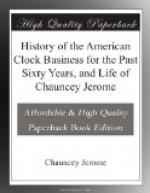It was a long and tedious undertaking to introduce my first cargo in England. Mr. Peck and my son wrote me a great many times the first year, that they never could be sold there, the prejudice against American manufactures was so great that they would not buy them. Although very much discouraged, I kept writing them to ‘stick to it.’ They were once turned out of a store in London and threatened if they offered their “Yankee clocks” again to the English people “who made clocks for the world;” “they were good for nothing or they could not be offered so cheap.” They were finally introduced in this way; the young men persuaded a merchant to take two into his store for sale. He reluctantly gave his consent, saying he did not believe they would run at all; they set the two running and left the price of them. On calling the next day to see how they were getting along, and what the London merchant thought of them, they were surprised to find them both gone. On asking what had become of them, they were told that two men came in and liked their looks and bought them. The merchant said he did not think any one would ever buy them, but told them they might bring in four more; “I will see” he says, “if I can sell any more of your Yankee clocks.” They carried them in and calling the next day, found them all gone. The merchant then told them to bring in a dozen. These went off in a short time, and not long after, this same merchant bought two hundred at once, and other merchants began to think they could make some money on these Yankee clocks and the business began to improve very rapidly. There are always men enough who are ready to enter into a business after it is started and looks favorable. A pleasing incident occurred soon after we first started. The Revenue laws of England are (or were, at that time) that the owner of property passing through the Custom-house shall put such a price on his goods as he pleases, knowing that the government officers have a right to take the property by adding ten per cent. to the invoiced price.




